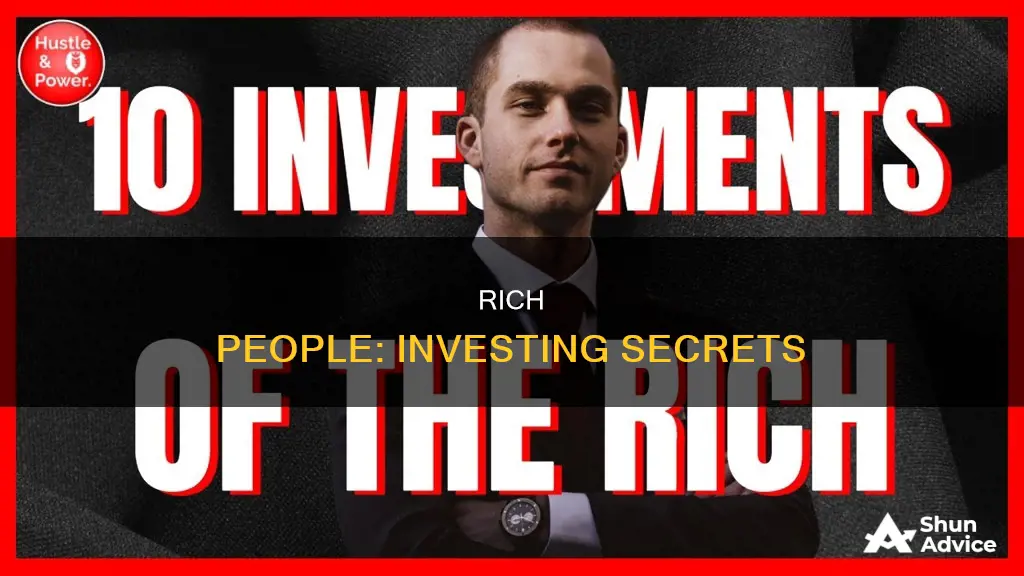
Ultra-high-net-worth individuals (UHNWIs) are defined as those with a net worth of at least $30 million. UHNWI individuals invest in a variety of assets, including real estate, stocks, private equity, and alternative investments such as fine art, vintage cars, and yachts. They also tend to have a large portion of their wealth in cash or cash equivalents, such as money market accounts and treasury bills, to offset market downturns and insure their portfolios. Additionally, they may invest in private equity and hedge funds, which offer higher returns but are less liquid.
| Characteristics | Values |
|---|---|
| Number of residences | Primary and secondary homes make up 32% of total wealth on average. The average ultra-high net worth individual owns 3.7 homes. |
| Stocks | Stocks comprise almost 20% of the average ultra-high net worth individual's wealth. |
| Private equity and venture capital | Private equity and venture capital investments account for 6% of total wealth on average. |
| Luxury investments | Luxury items such as art, classic cars, and watches make up an average of 3% of the total wealth of the ultra-rich. |
| Cash and cash equivalents | Millionaires may keep around 25% of their money in cash and cash equivalents to offset market downturns and insure their portfolios. |
| Real estate | Millionaires often have large and diverse real estate portfolios spanning several countries. |
| Private equity and hedge funds | Private equity and hedge funds are almost exclusively utilised by the wealthy. |
| Stocks and stock funds | Dividend-paying stocks and funds are tools for wealthy investors seeking diversified assets with minimal time management and low fees. |
| Alternative investments | Alternative investments include tangible assets like fine art, expensive musical instruments, rare books, vintage cars, and yachts. |
| Tax planning | The rich often engage in sophisticated tax planning strategies to optimise their financial position. |
What You'll Learn

Real estate
Tangibility
Leverage
Cash Flow
Rental income from real estate investments can provide a steady cash flow for investors. Even if the property is decreasing in value, rental income can cover expenses and mortgage payments, with surplus cash hitting the investor's pocket.
Control
Investing in real estate gives investors a sense of control over their investment. They can take measures to reduce costs, such as changing light bulbs to more efficient ones or sealing windows. They can also actively work to increase the income from the property by raising rents, billing residents for utilities, or adding ancillary income sources such as vending machines or laundry facilities.
Tax Advantages
Long-Term Wealth Building
AI-Assisted Investing: The Future of Finance
You may want to see also

Private equity
Some of the common steps private equity fund managers take to enhance the performance of their portfolio companies include:
- Strengthening the management team
- Acquiring new businesses to help improve operations and/or access new markets
- Shaping business strategy to position the company for future growth
- Developing and launching new products
- Streamlining and improving operations
- Optimising capital structure (the amount of debt and equity a company has)
The private equity industry has grown rapidly and tends to be most popular when stock prices are high and interest rates are low.
Retirement Investments: Living Off Profits
You may want to see also

Hedge funds
Overall, hedge funds offer wealthy individuals an aggressive and exclusive investment strategy with the potential for high returns.
Why Education is a Worthy Investment
You may want to see also

Stocks
While the ultra-wealthy do invest in stocks, they are more likely to own real estate and stakes in privately owned companies. However, there are some stocks that billionaires are buying.
Billionaires are currently investing in mega-cap tech stocks, with some of the top picks being Broadcom (AVGO), Oracle (ORCL), Google parent Alphabet (GOOGL), Microsoft (MSFT), and Amazon (AMZN). Billionaires are also investing in companies that are poised to benefit from the growth of artificial intelligence (AI), such as semiconductor and infrastructure software provider Broadcom (AVGO).
Billionaires also tend to invest in private equity, which refers to companies that are not publicly traded. These investments are typically more accessible to high-net-worth individuals, but there are some ways for smaller investors to get involved. For example, investors can own a piece of a private equity firm that holds stakes in privately held corporations, such as Ares Capital (ARCC), which is a business development company that lends to mid-sized companies and passes on the interest from these loans to its shareholders in the form of dividends.
Another way to invest like a billionaire is to look at their investment strategies. Billionaires tend to focus on their long-term investment goals rather than trying to keep up with their peers or the latest trends. They also understand the importance of savings and invest in a diverse range of assets, including physical assets such as real estate, land, gold, and artwork, which can balance out the volatility of stocks. Additionally, billionaires know how to take calculated risks and avoid common investing mistakes, such as investing only in the US and the EU, or only in intangible assets.
Rich People's Role in Economic Development
You may want to see also

Alternative investments
Some alternative investments include:
- Real estate (mutual funds, equity, partnerships, investment platforms)
- Tax lien certificates
- Commodities
- Farmland
- Cryptocurrency
- Merchant cash advances
- Timberland
- Mineral rights
- Intellectual property
- Privately underwritten mortgages
- Structured settlements
- Art
- Wine
- Coins
- Venture capital
- Peer-to-peer lending
- Hedge funds
- Annuities
One of the most popular alternative investments is real estate. Rich people often invest in multiple properties, including primary residences and commercial real estate. They may also invest in real estate investment trusts (REITs), which are companies that pool funds to invest in different types of properties.
Another popular alternative investment is art. The value of each piece is determined by its uniqueness, age, and the fame of the artist. While art can be an extremely expensive and illiquid investment, it can also lead to large returns.
Rich people may also invest in merchant cash advances, which is a form of business lending where a lump sum is exchanged for a percentage of future sales. This type of investment has a relatively low risk and can provide quick returns.
Other alternative investments include commodities, such as gold, silver, and cattle, as well as intellectual property rights for songs or movies, which can be very lucrative.
It's important to note that alternative investments are typically riskier than traditional investments and may have hidden risks. They also tend to be less liquid, meaning they can be difficult to sell quickly without losing value.
Middle-Aged Investors: Saving Enough?
You may want to see also
Frequently asked questions
Rich people tend to invest in a variety of assets, including real estate, stocks, bonds, private equity, hedge funds, mutual funds, and alternative investments such as fine art, vintage cars, yachts, intellectual property rights, and precious metals.
Rich people typically have a more long-term perspective when it comes to investing and focus on diversifying their investments across various asset classes to spread risk and seize growth opportunities. They also have access to exclusive investment opportunities, such as private equity, hedge funds, and venture capital deals, that may not be available to the middle class due to minimum investment requirements.
Rich people avoid making common investing mistakes such as only investing domestically, investing only in intangible assets, or trying to keep up with their neighbours in terms of purchases. They also periodically rebalance their portfolios and focus on achieving their long-term investment goals rather than comparing themselves to others.







